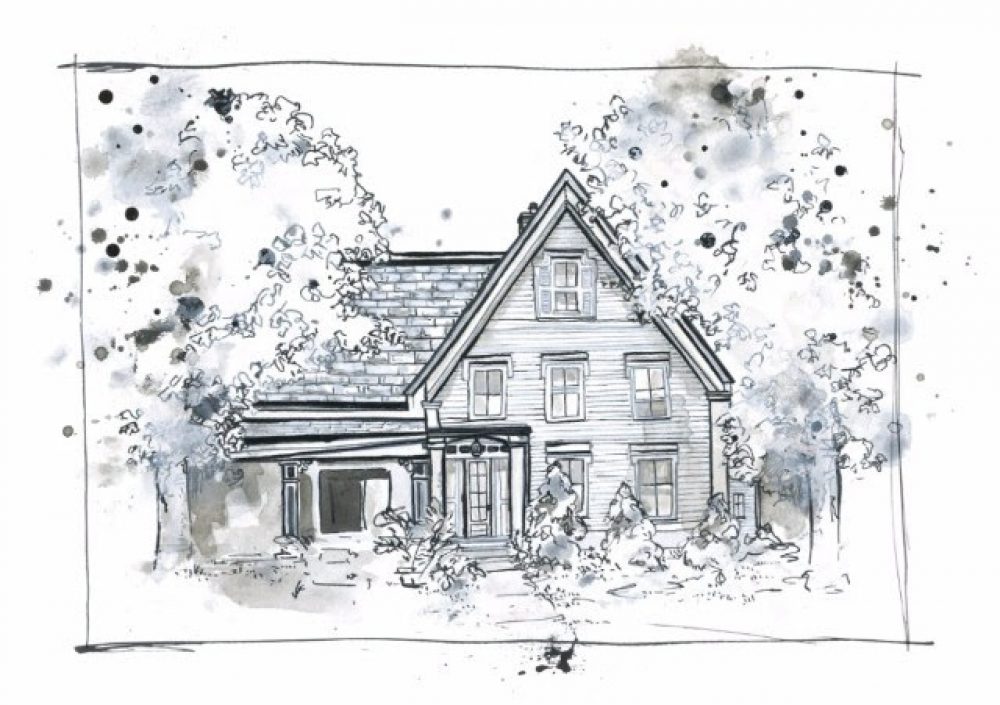Dear Milk Streeter,
Summer! The sights and scents of haying. The sweetness of fern, the hot aroma of wild sage, the occasional whiff of spearmint. The blast of heat up from the tractor, the wind turning leaves at the end of the field a milky silver, birds swooping down over the mowed grass. The rhythmic chugging of the baler, and the occasional snake, pressed flat to the hay, bound up with baling twine like a dull green ribbon.
Summer was also a time for farmhands, Onie and Herbie, who slept in the bunkhouse nearby. Herbie, thick and slow-moving, and Onie, lean like a string bean, showed up every day for noon dinner: a roast, baked potatoes, baking powder biscuits, a well-cooked vegetable, fresh milk from the Holstein out back, and molasses cookies or a slice of pie for dessert. Eating and talking didn’t go together; it was heads down and every man for himself. The potatoes were popped open with a whack of a fist and a sunny yellow pool of homemade melted butter soon followed.
And then the story-telling would resume. The adventures of Lightin’ Liz, the best-looking woman in town, or a word or two about the minister, the one who enjoyed stuffing his pockets with leftover cookies and soda cans from coffee hour. Or the time that Walter Mitchell’s body fell through the bottom of his coffin right into the hole when digging him a new grave. Or Old Dale who had a unique perspective on pigs. He had to load six pigs on a truck. The first two got on, then the other four started to get “rattle-headed.” Well, he just stood there and did nothing. Finally, all six were loaded. Dale commented: “Have to let the pigs think that they have outsmarted you!” Dale also kept horses. One day he fell off of Sassy and broke his ankle. Three days later his wife said, “Dale, there is something wrong with that horse; she’s just standing there with her head down.” Turns out that Sassy thought she had killed Dale so he called to her, she ran right over, and everything was fine from then on.
Most Vermont stories are not jokes per se; they are observations about human behavior. Jim Towne and John Armstrong never get along in life. The town clerk at the time noted, “Well, John Armstrong was born on Armstrong Road, died on Armstrong Road but, by golly, we buried him on Jim Towne Road!” Subtle irony is like tobacco; you chew on it to extract the full flavor. Speaking of tobacco, a local named Bubba used to chew tobacco on one side of his mouth and bubblegum on the other.
And, of course, there were stories about Yankee ingenuity. One farmer took an empty plaster bucket, balanced a thin stretch of wood on it with food at one end, right over the middle of the bucket. Rats would run along to get the food, the wood would tip, and the rats were trapped in the bucket. Or a friend of mine, who fashioned crow decoys out of Pabst Blue Ribbon cans spray-painted black. He would sit on his front porch after work, set out the decoys, then wait with a 12-gauge on his lap, drinking more of the Blue Ribbon.
Stories of disasters were common. A house that caught fire with the whole family carrying their possessions out of the flames, including a refrigerator that the dad had strapped to his back with a rope and a young boy with the family radio.
Many of the stories had to do with historical figures. Lincoln and Coolidge were always popular for their wit. Lincoln told the story of the railway inspector who was famous for writing long-winded reports. His boss told him to keep them short and to the point. A few days later, the railway line was badly flooded and his report read, “Sir, where the railway was, the river is now.”
It’s summer so it’s time to get back to mowing. Soon enough, we’ll start thinking about hunting season and spending time in the woods looking for a good spot for November. But for now, it’s time to enjoy a warm and lazy summer afternoon.
Cordially,

Christopher Kimball
Founder, Christopher Kimball’s Milk Street




